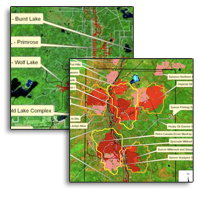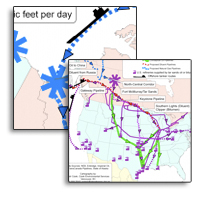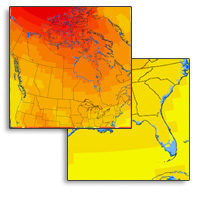Tar Sands 101
The Tar Sands "Gigaproject" is the largest industrial project in human history and likely also the most destructive. The tar sands mining procedure releases at least three times the CO2 emissions as regular oil production and is slated to become the single largest industrial contributor in North America to Climate Change.
The tar sands are already slated to be the cause of up to the second fastest rate of deforestation on the planet behind the Amazon Rainforest Basin. Currently approved projects will see 3 million barrels of tar sands mock crude produced daily by 2018; for each barrel of oil up to as high as five barrels of water are used.
Human health in many communities has seriously taken a turn for the worse with many causes alleged to be from tar sands production. Tar sands production has led to many serious social issues throughout Alberta, from housing crises to the vast expansion of temporary foreign worker programs that racialize and exploit so-called non-citizens. Infrastructure from pipelines to refineries to super tanker oil traffic on the seas crosses the continent in all directions to allthree major oceans and the Gulf of Mexico.
The mock oil produced primarily is consumed in the United States and helps to subsidize continued wars of aggression against other oil producing nations such as Iraq, Venezuela and Iran.
To understand the tar sands in more depth, continue to our Tar Sands 101 reading list
Athabasca Chipewyan First Nation takes province to court over tar sands leasing
First Nation takes province to court over oilsands leasing
Thursday, December 11, 2008
CBC News
Chief Allan Adam of the Athabasca Chipewyan First Nation speaks to reporters in Edmonton on Thursday.Chief Allan Adam of the Athabasca Chipewyan First Nation speaks to reporters in Edmonton on Thursday. (CBC)
The Athabasca Chipewyan First Nation in northern Alberta announced Thursday it has filed a request asking a court to review how Alberta grants leases for oilsands developments.
The notice was filed Wednesday in Edmonton's Court of Queen's Bench.
Canada: Oil and Immigration
Canada: Oil and Immigration
13/11/2008 by Gareth McConnell
It’s worth $1.5 trillion, is the largest in North America and for Canada and the world a potential source of petroleum energy and work in Canada for the next one hundred years.
Canada’s oil sands, situated in north-eastern Alberta in an area larger than the state of Florida and is about to become a major avenue to explore for migrants workers wishing to move to Canada.
TransCanada reduced to issuing shares to raise money to pay down debt
TransCanada to issue shares to raise money to pay down debt
Argus Leader
November 24, 2008
TransCanada has announced that it will issue 30.5 million shares of common stock to raise about 41 billion Canadian, or $809 million America, to pay down short-term debt and fund its Keystone Pipeline projects.
TransCanada entered into an agreement with a syndicate of underwriters to buy shares from the company at $33 Canadian and sell them to the public in Canada and the U.S.
Minnesota: Midwest oil mining a crude idea to many
Midwest oil mining a crude idea to many
Minneapolis City Pages
December 3, 2008 // By Beth Walton
Some 1,500 miles northwest of Minneapolis, the luscious green boreal forests that once lined the banks of the Athabasca River have been flattened. All that's left is an empty, lonely, gray moonscape. That, and the drills.
Polluted tar sands ponds leaking, report indicates
Polluted tar sands ponds leaking, report indicates
MARTIN MITTELSTAEDT / ENVIRONMENT REPORTER
December 9, 2008
The tailings ponds storing waste water left over from the processing of Alberta tar sands oil are leaking an estimated 11 million litres of contaminated water every day, according to a new report.
The figure, one of the first publicly available on the scale of the seepage from tailing ponds that dot the landscape in Northern Alberta, is being released today in a report by Environmental Defence, a Toronto-based conservation advocacy group.
15 undocumented workers arrested in BP raid (Whiting, Indiana refinery)
15 undocumented workers arrested in BP raid
December 10, 2008
By Andy Grimm Post-Tribune staff writer
WHITING - Immigration authorities arrested 15 janitorial workers in an early morning raid at the BP plant.
The raid came after at two-year investigation of United Building Maintenance, a Carol Stream, Ill.,-based cleaning company that had been hired by BP. The cleaning crews had access to sensitive areas of the refinery, said Gary Hartwig, special agent-in-charge of the Immigration and Customs Enforcement's Office of Investigations in Chicago.
Alberta rethinks film funding rules after anti-tar sands doc gets cash, Academy award nomination
Alberta rethinks film funding rules after anti-oilsands doc gets cash
Thursday, December 11, 2008
CBC News
A documentary that takes a critical look at the oilsands is raising a big stink at the Alberta legislature.
It turns out that Downstream, by U.S. documentary maker Leslie Iwerks, was funded in part by the provincial government.
That's prompted the government to take a closer look at how films get funded in Alberta.
Great Lakes, Great Peril: Oil and Water
Great Lakes, Great Peril: Oil and Water
Little city is at center of a great debate
Pipes link the Great Lakes with massive oil reserves in friendly Alberta. They may bring jobs, energy and pollution. And it's all happening as the century of oil gives way to the century of water.
By Dan Egan of the Journal Sentinel
Posted: Dec. 6, 2008
Great Lakes-Alberta tar sands connection
Journal Sentinel
First of two parts
Superior - U.S. dependence on foreign oil conjures images of derricks pecking at Saudi Arabian sands or supertankers steaming for coastal refineries.
Tar Sands: The worst fuel on the planet?
Tar Sands: The worst fuel on the planet?
A Reporter's Notebook: "Midwest oil mining a crude idea to many: Are we now scraping the bottom of the barrel?"
Photo from chicagotribune.com. Taken by Jiri Rezac / WWF UK.
As Minnesota sanctions the transport and use of oil sands--the second largest reserve of usable crude in the world--it takes a prominent role in a transcontinental controversy.
Many argue our state is on the wrong side.
From dead birds to sick humans and fish, hardly anyone has anything positive to say about the new carbon intensive fuel polluting our air and water.
David Suzuki: Tar sand wealth comes with environmental costs
David Suzuki: Tar sand wealth comes with environmental costs
By David Suzuki and Faisal Moola
If you want to be scared, you don’t need to watch a horror movie or read the latest Stephen King bestseller.
Real terror can be found by simply firing up Google Earth, the computer program that allows users to look at satellite pictures of any place on the planet. By mousing over and zooming in, you can see what Alberta’s tar sands look like from space.
It is not a pretty sight. In fact, it’s scary—and for good reason.



